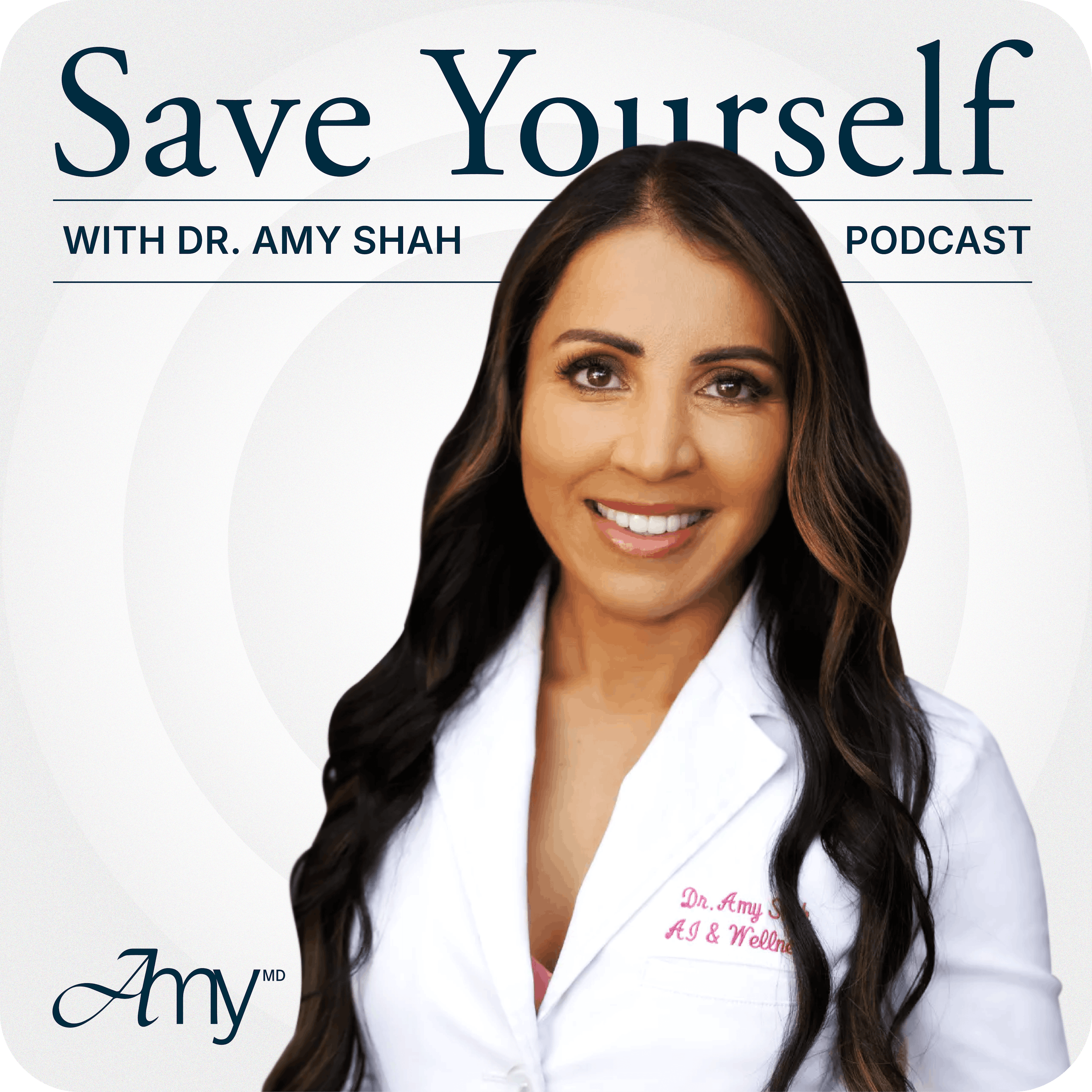.jpg)
Mindfully Integrative Show
Welcome to the Mindfully Integrative Podcast! We are dedicated to featuring inspirational and successful individuals who have embraced mindful investing to achieve optimal integrative wellness. Our podcast dives into all aspects of mindfully incorporating integrative functional health into our lives, aiming to help create a more balanced and fulfilling life. New episodes are released every Friday and cover a wide range of informative and entertaining topics, interviews, and discussions.
We explore a mindful approach to the mind-body connection with guests discussing various topics in integrative holistic health. This includes areas such as whole health, functional medicine, spiritual health, financial health, mental health, lifestyle health, mindset shifts, physical health, digital health, nutrition, gut health, sexual health, body positivity, family health, pet health, business health, and life purpose, among others.
Dr. Damaris G. is an Integrative Doctor of Nursing Practice, a Family Nurse Practitioner, a mom, and a veteran. For collaboration, interviews, or to say hi, you can contact her via email at damaris@mindfullyintegrative.com. You can also find her on LinkedIn at or https://www.linkedin.com/in/damarisdnp/. To join our membership and access resources, visit our website at https://mindfullyintegrative.com .
Please note that the information shared here is for informational and educational purposes only and should not be considered medical advice. Always consult with a physician or other licensed healthcare provider when making healthcare decisions. Enjoy the podcast!
Mindfully Integrative Show
Eat Your Way to Better Metabolic Health: Unlocking the Power of GLP-1
Sponsor Affiliates
Empowering Your Health
Get YOUR Own
Joburg Protein Snacks
Discount Code: Damaris15 Or Damaris18
Feeling need to Lose Weight & Become metabolically Healthy
GET METABOLIC COURSE GLP 1 REseT
This course is designed for individuals looking to optimize their metabolic health through integrative and functional medicine approaches. Whether you're on a GLP-1 medication or seeking natural ways to enhance your metabolic function, this course provides actionable steps, expert insights, and a personalized roadmap sustainable wellness.
Are you feeling stressed, tired, or Metabolism imbalanced?
Take advantage of our free mindful steps to help improve your well-being.
ENJOY ONE OF our Books
Mindful Ways Health Wealth & Life
https://stan.store/Mindfullyintegrative
Join Yearly membership ALL IN ONE FUNCTION HEALTH
Ask Us for help...
Hi, how are you? So let's get into this lesson of dietary interventions and how it supports the GLP-1 function in your body, whether you're taking a medicine or you're naturally boosting it. So glucagon-like peptides is a hormone that plays a critical role in appetite regulation, blood glucose and metabolic health, and it's secreted in the gut and it helps with your food intake, right? So how does it do? It Enhances your insulin secretion, improving blood sugar, slowing gastric emptying and reducing the appetite. When it's directly influenced by what you're putting in your body, you're going to boost it. Now what certain foods can do this? Surprisingly, there's a lot of good foods that can do that Enhance your metabolic health, improve your insulin sensitivity and support weight management.
Speaker 1:Major major foods are protein. So, um, I'll talk more in depth on what kind of protein that you need, but think about stimulating the production by improving and regulating your hunger. Improve metabolic function by protein-rich foods. High protein stimulates GLP-1 secretion, helps reduce post-meal glucose spikes. It keeps you more full longer. Best protein sources are GLP-1. Loves, loves, produces. When you have more eggs, it produces and boosts your GLP-1, reduces your appetite. Fatty fishes, like salmon. Mackerel sardines like a Mediterranean, but protein-wise, lean meats, chicken, turkey, grass-fed meat Mediterranean, but protein wise lean meats, chicken, turkey, grass fed meat, plant based proteins you can get tofu, tempeh, lentils, black beans, algae, quinoa many good sources of fiber in there too. And why does the protein matter? It slows the digestion. It's keeping you full longer. It stimulates muscle maintenance, which is important for metabolism, especially when you hear that GLP-1s are maybe getting rid of the muscle, right? So you want to make sure you're not losing that muscle and you're losing just the fat. So how do you do that? You maintain muscle. You would maintain working out, you maintain lifting, you maintain intake of protein.
Speaker 1:I talk a lot about intake of protein and think of it like if you can do one gram for half your body weight. If you're 150 pounds, let's say you want, I'd like you to get about 75 grams of protein a day. That's a give or take. I mean, obviously there's a little bit more to it, but that would be the quick and easy. That's a give or take. I mean, obviously there's a little bit more to it, but that would be the quick and easy. And when you're looking at the protein, look at the box, make sure it's high quality protein and it is not low. So why does it matter. It slows digestion and stimulates your muscle maintenance, and it gets you to where you need to be.
Speaker 1:So let's talk about the macros of high fiber foods. Now, what would that do for you? In GLP-1s, we're talking about the gut, right? So it does slow the digestion because that is part of its job. So how do you improve that? Well, you improve that by getting more dietary fiber.
Speaker 1:When someone says I'm constipated, I'm at a plateau, I don't understand what's going on. Well, what are they putting in their body? Are they drinking alcohol? Are they not hydrating and do they not have enough fiber? How do you do that? You benefit your body by steadying the glucose release within the body and in the bloodstream. Best things you can do vegetables like broccoli, quinoa, brussels sprouts, fruits, broccoli, quinoa, brussel sprouts, fruits, legumes, berries, fruits, berries, pears, bananas, citrus, soluble things that are really good for the body. Whole grains, whatever that is for you. It helps slow digestion and it matters because in this one, it absorbs the excess glucose, it prevents blood sugar crashing, feeds your bacteria, your gut bacteria, what it needs. So that enhances the GLP-1, because when it has the bad bacteria, GLP-1 is suppressed and those L cells will never be produced in the small intestines. When you understand that, you understand why your medications are not working. So when someone says, oh, this is it, they're not working, you're not doing the right foods to promote enhanced and better care so that you can weight loss. When you understand where your body is and where you're at, then you can make change now and it can last longer.
Speaker 1:So add in, let's talk about healthy fats. So there's good and bad fats. You know what is that? Polysaturated or unsaturated saturated? You know you want to have those that are going to improve your gut integrity, reduce the inflammation, support yourself from feeling that fullness so that you can get your hormones regulated. Now the polysaturated fats are the ones that we have problems with when there's all those excess and those seed oils. The best quality foods that you can get really are from things of monosaturated. So let's think avocados, think sustained energy, better, more fullness. Nuts, seeds, olive oil, fatty fishes again, like mackerels, sardines, salmon. They're really packed with a good quality amount of omega-3s that you can get.
Speaker 1:It improves your gut lining and reduces insulin resistance and inflammation, because those cells mitochondria and regular cells are made of phospholipid layers that are beneficial with inflammatory process. Why do healthy fats matter In this case, it helps your appetite hormone regulation and reduces those cravings. It improves cellular insulin response, preventing blood sugar spikes, supports gut health and is crucial for optimal GLP-1 secretion. You know they're all very important in what you put into your body. The importance of each of these macros protein, fiber, fats so think the fiber is more like the carbs. Get your protein or fats.
Speaker 1:You want to have more of the whole foods to help balance you out and when you pick the right things and less of the junk, you're going to regulate your body. So it improves your insulin resistance, glp-1 function and weight management. It takes your takeaway. Think of it as more nutrient dense instead of what you don't put in your body. Think about what you could put in your body more whole foods, nutrient dense and how does that optimize your support for your body? Now, that's different for each person, but I'm going to tell you. You know the. You boost your metabolism by showing your body what it needs, and the nutrient dense foods is a priority in that boost and help support your weight management. This improves a long-term metabolic health, not short-term, not a quick fix, not a yo-yo diet.
Speaker 1:So what is good for you? So what is a nutrient-dense foods Stated before. Nutrient-dense means minimally processed and packed with vitamins, minerals, fiber and healthy fats. Fill your body with and enhance your metabolic function. How do you do that? Again, whole foods. Nutrient-dense food, think no additives, the fresher if it doesn't have an extra ingredient in it. It's probably better. Just broccoli, just fruit, just things of that nature. Nutrient-dense, like leafy greens. Sometimes there's supplements that are needed wild-caught fish, legumes, avocados, anti-inflammatory foods. There is a whole bunch of things that I would talk about this, but think of it like it supports the gut health and inflammation. That enhances more GLP secretion. When you have fermented foods omega-3s, poly, think the more colors, the more better or antioxidants it'll be for your body. Now, ways to do this and enrich it are more whole food support Think broccoli, spinach, lean proteins, chicken, fish, tofu, eggs, healthier fats, avocados and oils.
Speaker 1:Improving the insulin resistance, because it's going to contribute to, you know, building up better fat storage and improving your insulin resistance. So when you're talking about each of these and why they matter, you know the goal is to be balanced right. You're not going, you're not trying to have the bad stuff. You're trying to put in what will optimize your life so that you can have weight management and quality metabolic health. Now you know that's the goal right. You want to enhance your fullness, you want to have fat burn, be metabolically healthy, not have hyperinsulinia within the body, improve the gut overall and your microbiome balance, and when you take each one of these tidbits, these will help and it's definitely manageable because in this sense, then, you're trying to prevent yourself from having hyperinsulinia, which then can cause many chronic illness or type two diabetes, protects you from overall obesity, other related diseases and metabolic issues. It enhances your levels, helps you stabilize your mental clarity and supports your heart health, and I hope this helps. See you in the next lesson.
Podcasts we love
Check out these other fine podcasts recommended by us, not an algorithm.

The Dr. Hyman Show
Dr. Mark Hyman
Functional Fertility with Dr. Kalea Wattles
Kalea Wattles
On Health for Women
Aviva Romm
Save Yourself With Dr. Amy Shah
Dr. Amy Shah
Huberman Lab
Scicomm Media
The Peter Attia Drive
Peter Attia, MD
The Metabolic Classroom with Dr. Ben Bikman
Insulin IQ
FoundMyFitness
Rhonda Patrick, Ph.D.
Change Your Brain Every Day
Dr Daniel & Tana Amen
The Dr. Josh Axe Show
Dr. Josh Axe
Pursuit of Wellness
Mari Llewellyn & Pursuit Network
Feel Better, Live More with Dr Rangan Chatterjee
Dr Rangan Chatterjee: GP & Author
The Level Up Podcast w/ Paul Alex
Paul Alex Espinoza
Faith Over Fear
Jennifer Slattery, Faith Over Fear Author and Speaker
